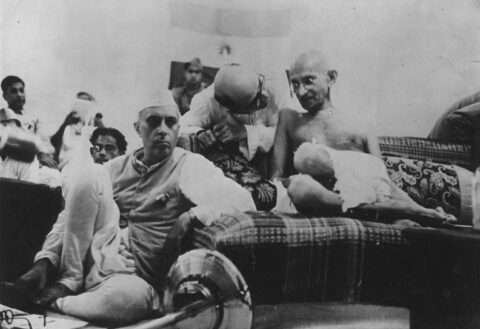In UnHerd, Pratinav Anil recounts some of the changes to Gandhi’s reputation and place in Indian public memory:
Gandhi, poor fellow, had his ashes stolen on the 150th anniversary of his birth. “Traitor”, scrawled the Hindu supremacist malcontents on a life-size cut-out of the Mahatma at the mausoleum. That was a couple of years ago, but it’s a sentiment that’s grown shriller since. Unsurprisingly. In government as in schools, in newsrooms as on social media, the founding father’s defenders are being put out of business by his detractors. His Congress Party, after 50 years of near-uninterrupted rule since independence in 1947, is now in ruins, upstaged by the Bharatiya Janata Party. Hindu supremacists have stolen the show, while India’s Muslims, Christians, and Dalits are persecuted. With the changing of the guard, Gandhi’s extravagant ideal — unity in diversity — has gone the way of his ashes.
His reputation, too, is in tatters. Last year, the National Theatre staged a play about his assassination. But The Father and the Assassin centred not on Gandhi but Godse, the man who killed him 75 years ago this week. Here is a tender portrait of a tortured soul, a blushing boy raised as a girl to propitiate the gods who had taken away his three brothers, who becomes radicalised and blames Gandhi for betraying Hindus and mollycoddling Muslims, so causing Partition. It is no accident that Godse was a card-carrying Hindu supremacist, a member of the parent organisation of the BJP, to which India’s new ruler Narendra Modi belongs. Today, statues of Godse are going up across the country just as statues of Gandhi are being pulled down across the world.
Needless to say, this is a most disturbing development. Yet the reaction of liberals, Indian as well as Western, has been no less troubling. An unthinking anti-imperialism of old has joined up with an unthinking anti-Hindu supremacism of new to beget a bastardised Gandhi. What we have is not a creature of flesh and blood, possibly a great if also flawed man, but rather a deified hero. This is the Gandhi with a saintly halo around him who greets you from Indian billboards, grins at you from rupee notes, stares down at you from his plinth on Westminster’s Parliament Square, and, in Ben Kingsley’s portrayal of him, slathered in a thick impasto of fake tan, moves you to a standing ovation.
This is the easily comestible fortune-cookie Gandhi you encounter in airport bestsellers such as Ramachandra Guha’s double-decker hagiography, and also the sartorial icon whose wire-rim glasses were emulated by Steve Jobs. There is the Gandhi of the gags, most famous for a retort he probably never made: asked what he thought of Western civilisation, the Mahatma is reported to have replied: “I think it would be a good idea.” Ba-dum ching! Then there’s the Christological Gandhi, a modern messiah turning the other cheek: “An eye for an eye leaves the whole world blind.” There’s also Gandhi the self-help guru: “Be the change that you wish to see in the world.” One could go on.
Here’s where the historian in me says, would that it were so simple. Gandhi was no liberal. And if those who sing his praises today knew a little more about Gandhi the man, rather than Gandhi the saint, their adulation would very quickly dry up. The fact is that the Mahatma hasn’t aged well. He detested democracy, defended the caste system, and had a deeply disturbing relationship with sex.
None of this should surprise us. Unlike some of the more cerebral thinkers of his cohort, figures such as Ambedkar and Periyar, Gandhi possessed a shallow mind. The product of a rather parochial education, admittedly the best that could be bought in turn-of-the-century western India, he struggled to juggle academic and conjugal demands. His precocious marriage to Kasturbai at 13 was a misalliance, perennially troubled by his suspicions of her infidelity. Not the sharpest knife in the drawer, he dropped out of Samaldas College. It was only in London, where he went to read law, that his horizons widened.
Then again, not for the better.




